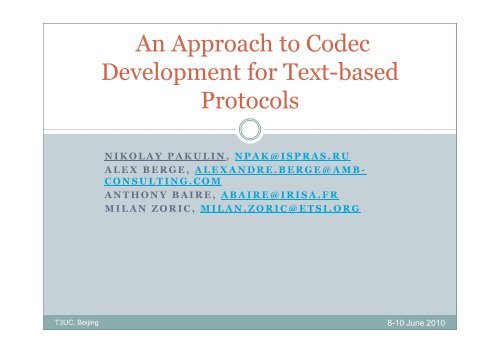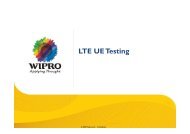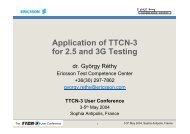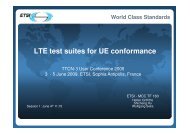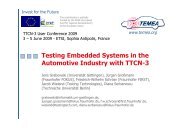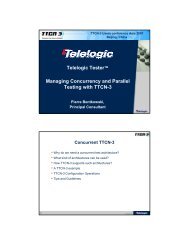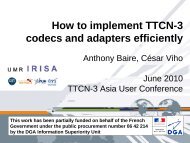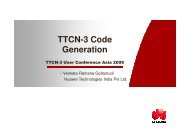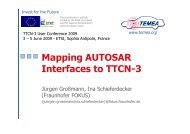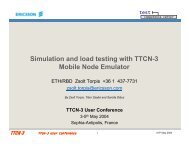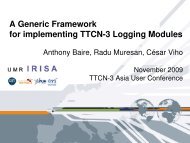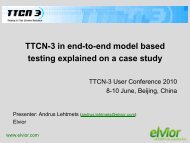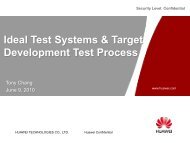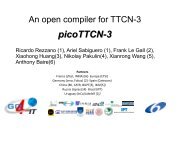An Approach to Codec Development for Text-based ... - TTCN-3
An Approach to Codec Development for Text-based ... - TTCN-3
An Approach to Codec Development for Text-based ... - TTCN-3
- No tags were found...
Create successful ePaper yourself
Turn your PDF publications into a flip-book with our unique Google optimized e-Paper software.
<strong>An</strong> <strong>Approach</strong> <strong>to</strong> <strong>Codec</strong><strong>Development</strong> <strong>for</strong> <strong>Text</strong>-<strong>based</strong>Pro<strong>to</strong>colsN I K O L A Y P A K U L I N , N P A K @ I S P R A S . R UA L E X B E R G E , A L E X A N D R E . B E R G E @ A M B -C O N S U L T I N G . C O MA N T H O N Y B A I R E , A B A I R E @ I R I S A . F RM I L A N Z O R I C , M I L A N . Z O R I C @ E T S I . O R GT3UC, Beijing8-10 June 2010
Motivation <strong>Text</strong>-<strong>based</strong> pro<strong>to</strong>cols are widely used in IT FTP, HTML/SIP/SDP, SMTP/POP3/IMAP4 … <strong>Text</strong>-<strong>based</strong> pro<strong>to</strong>cols utilize simple syntacticstructures Could be defined using regular expressions Do we need Java/C/C++ coding <strong>to</strong> develop codecs?T3UC, Beijing8-10 June 2010
Proposal Develop general-purpose codec <strong>for</strong> text-<strong>based</strong>pro<strong>to</strong>cols Extensible at low cost Portable: OS-agnostic Facilitating debugging and log analysis Make it reusable in any <strong>TTCN</strong>-3 environment Utilize TCI / TRI Implement pro<strong>to</strong>type Apply <strong>for</strong> SIP/SDP codec <strong>for</strong> IMS SIP con<strong>for</strong>mance test systemT3UC, Beijing8-10 June 2010
Decoding Strategies <strong>for</strong> <strong>Text</strong>-<strong>based</strong> Pro<strong>to</strong>cols Greedy decoding charstring reads all characters Records are decoded field by field Very basic, not practical:For example: how <strong>to</strong> decode user@example.com? Regular-expression <strong>based</strong> decoding Regular expression defines the scope of the value and decomposes itsstructure]+)>:group 1 -> field ‘user’, group 2 -> field ‘site’< and > are boundaries of the value Manual cus<strong>to</strong>mization Implement specific decoding algorithm in the target languageT3UC, Beijing8-10 June 2010
Encoding Strategies <strong>for</strong> <strong>Text</strong>-<strong>based</strong> Pro<strong>to</strong>cols Format-<strong>based</strong> encoding Format specifies wrapping of the encoded value: Records are encoded field by field Very basic:For example: how <strong>to</strong> encode template {“user”, “example.com”}? Pattern-<strong>based</strong> encoding Pattern defines the structure of the encoded value:field ‘user’ is encoded first, then “@” goes, then field ‘site’ isencodedThe values is wrapped in<strong>to</strong> < > Manual cus<strong>to</strong>mization Implement specific encoding algorithm in the target languageT3UC, Beijing8-10 June 2010
<strong>Codec</strong> development process<strong>TTCN</strong>-3SourceDevelopregularexpressionsDevelopencodingpatternsConfig.FilesDevelopmanualcodecsCODECT3UC, Beijing8-10 June 2010
Architecture OverviewTypesTest SystemATS<strong>TTCN</strong>-3<strong>TTCN</strong>-3SourceEncoderDecoderConfigCODECCoDeclibraryAdapterManualCoDecJavaT3UC, Beijing8-10 June 2010
Main Components <strong>Codec</strong> library – implements basic coding and decodingalgorithms <strong>for</strong> text-<strong>based</strong> pro<strong>to</strong>cols Coder/Decoder configuration files – provide configurationparameters <strong>for</strong> <strong>Codec</strong> library XML <strong>for</strong>mat <strong>TTCN</strong>-3 type in<strong>for</strong>mation Regular expressions <strong>for</strong> decoding Encoding patterns Manual <strong>Codec</strong> in Java/C++ Very few (e.g. approx. 3% of LibSip types)T3UC, Beijing8-10 June 2010
Benefits of the Architecture <strong>Development</strong> simplification Define regular expressions + encoding patterns No need <strong>for</strong> intensive Java/C++ development Extensibility of the test suite No Java/C++ coding <strong>to</strong> extend codecs <strong>for</strong> new types Maintainability of the test suite Re-define regular expressions + encoding patterns Little probability of re-compilation if <strong>TTCN</strong>-3 test suitechanges Test system robustness Only few codecs require Java/C++ programmingT3UC, Beijing8-10 June 2010
Configuration File Format XML is selected because: Self-validating due <strong>to</strong> XML schemes Structured and self-documenting XML configuration Type in<strong>for</strong>mation – integer, charstring, record/set, record/se<strong>to</strong>f, union, enumerated; optional fields <strong>Codec</strong> in<strong>for</strong>mation Decoding strategy Encoding strategy Validation <strong>to</strong>ol In<strong>for</strong>ms about problems in XML configurationT3UC, Beijing8-10 June 2010
XML Configuration Look and Feel Type <strong>Codec</strong>[^@]+(?:(${userRe})@)?(.*)[${userInfo}@]${siteInfo}T3UC, Beijing8-10 June 2010
<strong>Codec</strong> Library in Java 130 Java classes in 7 packages, 10 KLines of source code Supported <strong>TTCN</strong>-3 types: Primitive types: charstring and integer Enumerated types Composite types: record, record of, set, set of, union Omit values Supported decoding strategies: Greedy straigh<strong>for</strong>ward Regex-<strong>based</strong> Manual cus<strong>to</strong>mization Supported encoding strategies Format-<strong>based</strong> encoding Pattern-<strong>based</strong> encoding Manual cus<strong>to</strong>mizationT3UC, Beijing8-10 June 2010
Validation Robustness of the codec library is the key fac<strong>to</strong>r in therobustness of the whole test system Test all components of the <strong>Codec</strong> Library duringdevelopment Test immediately Unit testing – tests <strong>for</strong> each method of each class Goal: 100% coverage of the source Java code Tools: JUnit testing framework, Eclemma coverage <strong>to</strong>ol Test everything Integration testing – test how all components work <strong>to</strong>gether Goal: cover all variations of the inputs Tools: <strong>to</strong>rture tests, loopback testsT3UC, Beijing8-10 June 2010
Case Study: IMS/SIP In 2009-2010 GO4ITC project implemented IMS/SIPETS Using TTworkbench IDE (Java) ETSI IMS/SIP test specification ETSI INT TS 102 790 LibSip library: 147 types <strong>Codec</strong> implemented Regular expressions: 306 Templates: 148 Manual codecs: 4 types (2.7%) <strong>Codec</strong> Validated Loopback tests and RFC 4475 SIP Torture testsT3UC, Beijing8-10 June 2010
Potential Directions <strong>for</strong> Future Work Extending the implementation Extending Java implementation Porting the <strong>Codec</strong> library <strong>to</strong> C/C++ Extending the method Grammar-<strong>based</strong> decoding strategy XML messages coding/decoding Binary pro<strong>to</strong>cols support Extending the usability Integrating with <strong>TTCN</strong>-3 development environmentsT3UC, Beijing8-10 June 2010


